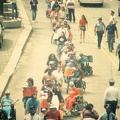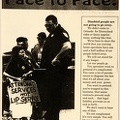Title: 73 arrests in wheelchair melee
by Darryl E. Owens
Orlando Sentinel Monday 10/7
[This article is continued on ADAPT 688 but the entire text is included here for easier reading.]
PHOTO by Tom Fitz/Sentinel: A woman (Anita Cameron) is being shoved over by a security guard or police officer, only his arm is visible. Her face shows pain and fear. She is falling into the lap of a woman in a wheelchair (Jennifer McPhail) who looks down at Anita and is being held forward by a woman and a man protester who are looking at the police. Behind Jennifer is another wheelchair user and behind them is another ADAPTer in a wheelchair and a man standing (Chicken-man Carl ______). Over the shoulders of the other two protesters more ADAPT protesters, in wheelchairs and standing, are up against other barriers but looking at what is happening to Anita. In the background the ADAPT bubble van is visible.
Caption: [Unreadable][Anita]Cameron of Denver is shoved in confrontation with Peabody security force members
Title: Disabled place hotel under siege
by Darryl E Owens of the Sentinel Staff
The battle lines were drawn early Sunday afternoon.
For Wade Blank and the 210 or so members of ADAPT, or American Disabled for Attendant Programs Today, the plan was simple.
“We're going to block the entrance to the hotel because those people block our lives," he said of the American Health Care Association, which represents nursing home operators and has attracted 3,500 people to a convention this week at the Peabody Hotel.
On the other side, hotel security and about 130 Orange County deputies and Florida Highway Patrol troopers were standing by to stop any protesters who blocked the doors with their bodies or their wheelchairs.
“The main goal is to assist and help these people in a professional and sensitive manner," said sheriffs spokesman Cpl. Doug Sarubbi. “But when they break the law. we’ve got to enforce it."
When the battle ended, one person had been hurt. one had suffered a heart attack and at least 73 had been arrested as ADAPT launched its four-day protest demanding fewer people be kept in nursing homes and more money be devoted to caring for the disabled at home.
It was a battle authorities had mapped out extensively, making sure officials and facilities could accommodate the 'protesters' disabilities, said Sarubbi and Ed Royal, the Orange County Jail's assistant corrections director of programming.
The costs of the special provisions had not been added up late Sunday, Sarubbi said.
“This wasn't supposed to be the big day" of the protest, Sarubbi said. “We expect it every day and are prepared for whatever happens."
More arrests were expected late Sunday, Sanibbi said. Each protester was charged with trespassing, taken to the Orange County Jail and held on $1,000 bail.
A woman apparently was cut on the head when a table or bicycle lock fell on her while she tried to break through a barricade at the north entrance of the hotel.
Pat Hasley, a top Peabody security specialist, suffered a heart attack outside the hotel and was taken to SandLake Hospital. His condition was unknown late Sunday.
In demonstrations across the country, ADAPT has blocked meetings, disrupted speeches and shut down offices.
“We chose to shut down the able-bodied system that suppresses us," ADAPT co-founder Blank said. "If they choose to arrest us, so be it."
Denver-based ADAPT wants Medicaid to redirect 25 percent of its $23 billion nursing home budget to home care for the disabled. The group also wants 45 minutes on the convention agenda to make its position known.
“We‘re not trying to change the world," said Toni Funderburk, who calls herself a nursing home survivor. “We're just trying to live in it."
Linda Keegan, a vice president for the nursing home association, said the group could better spend its time at the bargaining table rather than barricading buildings.
“I think it would make a bigger difference if they sit down with us and come to a compromise.
"It's not our money to give," she said. “The real issue is an issue of choice. There needs to be choice on both sides. The only approach that makes sense is to sit down and form a compromise that makes sense for all."
Sunday's showdown began at 12:35 p.m. as protesters filed out of the Clarion Plaza Hotel, across the street from the Peabody, with a phone number to a group lawyer scrawled on their arms, shouting "Hey! Hey! Ho! Ho! Nursing homes have got to go!"
Others carried signs with such slogans as "End apartheid Destroy nursing homes" as others waved a modified U.S. flag with the stars forming the universal handicapped symbol.
As the first protesters reached the Peabody parking lot, deputies confronted them. The protesters climbed out of their wheelchairs, crawled on the ground and tried to scoot past and through the legs of deputies in a race for the hotel doors.
“Get to that damn door," barked Bob Kafka, a Texas ADAPT organizer. “Go! Go! Go!"
Security scrambled to block the protesters, but ADAPT members managed to create a logjam at the entrance with their bodies or wheelchairs.
“It's inconvenient," Peabody general manager Michael French said of the protest. “We respect their right to protest, but they must respect our right to operate a business."
After the protesters refused security workers' request to leave, several school buses arrived, specially equipped for the disabled. Authorities brought in a moving van for non-disabled protesters.
“We tried civil means and they just give us a cookie, pat us on the back and say, ‘Go away,'" Funderburk said.
Deputies carried crawling protesters and ushered wheelchair users into the vehicles.
The display drew looks of disbelief from some hotel guests and empathy from others.
“It's awful," said Elma Oeters, visiting from Europe.
Jacqueline Krygsman of Holland called the situation ridiculous, saying her country has a national health care policy. “They should have things at home."
Police shuttled prisoners across the street to a makeshift booking office at the Orange County Convention and Civic Center before taking them to jail.
Royal said open bay cells normally reserved for juveniles, psychotic inmates and those with other special needs were used for the protesters in wheelchairs. Guards were on duty in the bays.
The open bays, which normally hold about 60 people, contained between six and 10 handicapped people, depending on their needs. Four nurses were added to the normal staff of five, he said.
"The corrections staff underwent special training to understand the needs of handicapped individuals," Royal said.
Other special provisions made by the jail included obtaining hand-held commodes and arrangements for the care of any guide dogs accompanying blind protesters.
Those arrested will have to go through the normal process to be released. “Those who are able to bond will be allowed to bond," Royal said.
“Those who are not able to bond will have to go to first appearance before a judge in the morning."
Most protesters, after being informed of the $1,000 bond, said they could not afford to pay and would remain in jail, Blank said.
"I guess Orlando wants to prove a point," he said. “We didn't travel 1,900 miles to haul it in after one day. It's not like it‘s anything new. Nursing homes or jail. We know what being incarcerated is all about."
Mary Brooks of the Sentinel staff contributed to this report.
- Author
- Orlando Sentinel/Darryl E Owens & Mary Brooks contributed. photo: Tom Fitz
- Created on
- Friday 12 July 2013
- Posted on
- Friday 9 November 2018
- Tags
- ADAPT - American Disabled for Attendant Programs Today, AHCA - American Health Care Association, Anita Cameron, arrests, blocking, Bob Kafka, Carl ___, chanting, crawling, Europeans, Florida Highway Patrol, guide dogs, heart attack, jail preparations, Jennifer McPhail, nursing home industry, Peabody Hotel, police preparations, school bus paddy wagon, security guards, sheriff's deputies, Toni Funderbuck, Wade Blank
- Albums
- Visits
- 2024
- Rating score
- no rate
- Rate this photo


0 comments